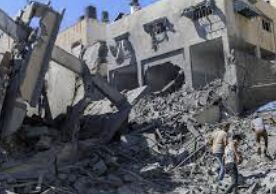Gaza Crisis Escalates: Mass Displacement, Dire Humanitarian Emergency, and Devastating Death Toll
A dire situation unfolds in Gaza as mass displacement and limited aid exacerbate the humanitarian catastrophe, with hospitals running out of fuel and residents lacking basic necessities. The international community is urged to take urgent action.
The situation in Gaza is becoming increasingly dire as Israel's military warns residents that they risk being identified as accomplices in a terrorist organization if they do not move south. This has led to mass displacement, with hundreds of thousands of people cramming into temporary refuges, despite the ongoing air and artillery strikes that also target these areas. After two weeks of a total Israeli siege, the first limited supplies of aid arrived on Saturday. However, relief agencies warn of a humanitarian catastrophe, as hospitals are running out of fuel to power incubators and other critical equipment.
The Israeli forces, preparing for a ground assault, have been relentlessly bombarding the strip since the Hamas militants launched attacks on Israeli towns, resulting in the deaths of over 1,400 people and the capture of over 200 hostages. The bombardment has led to a devastating death toll, with 4,650 Palestinians killed, according to the Hamas-run health authorities. In the past 24 hours alone, 266 people, including 117 children, have lost their lives. This has prompted widespread concern among aid agencies and the international community.
While the aid that arrived on Saturday has started to be distributed, a second convoy has not yet reached Gaza, despite entering the Rafah border crossing. The supplies have been given to specific agencies, including UNICEF and the Qatari Red Crescent, with some earmarked for hospitals and UN-run shelters. However, many Gazans feel that the amount of aid received is insufficient, describing it as pathetic. In addition to the lack of aid, Gaza residents are also facing a severe fuel shortage. Israel's military has warned that fuel could be used by Hamas, and therefore, it has not been included in the supplies. This has put hospitals and other critical services at risk, as their power supply is dwindling.
At al-Shifa Hospital, one of Gaza's largest, the fuel tanks are almost empty, raising concerns about the fate of the 130 newborn babies in electrically powered incubators. The United Nations agency for Palestinians, UNRWA, has warned that it will run out of fuel in three days. Without fuel, access to water, functioning hospitals, and bakeries will be severely impacted, exacerbating the already challenging conditions for Gaza residents. Long queues have formed at bakeries, with little bread available, leaving many people concerned about the lack of food and drink for the entire population.
Amidst the desperate situation, Gazans are pleading for an end to the war and the cessation of blind bombing of civilians. They feel abandoned and accuse Israel and the United States of seeking to starve the Palestinian population. The international community must take urgent action to address the humanitarian crisis unfolding in Gaza and work towards a peaceful resolution to the conflict.




